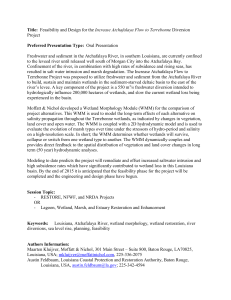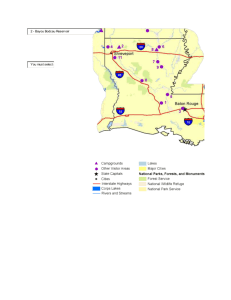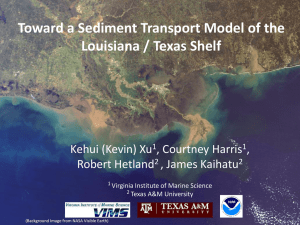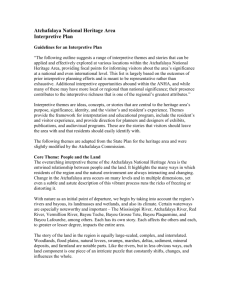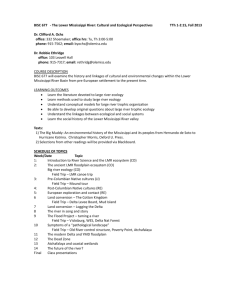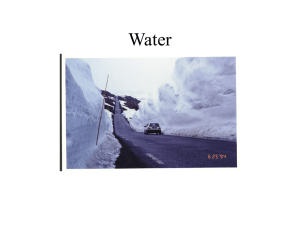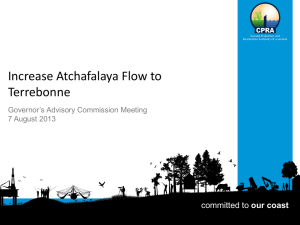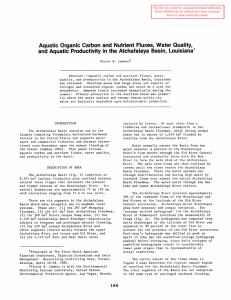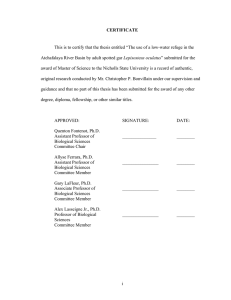5. Atchafalaya Basin
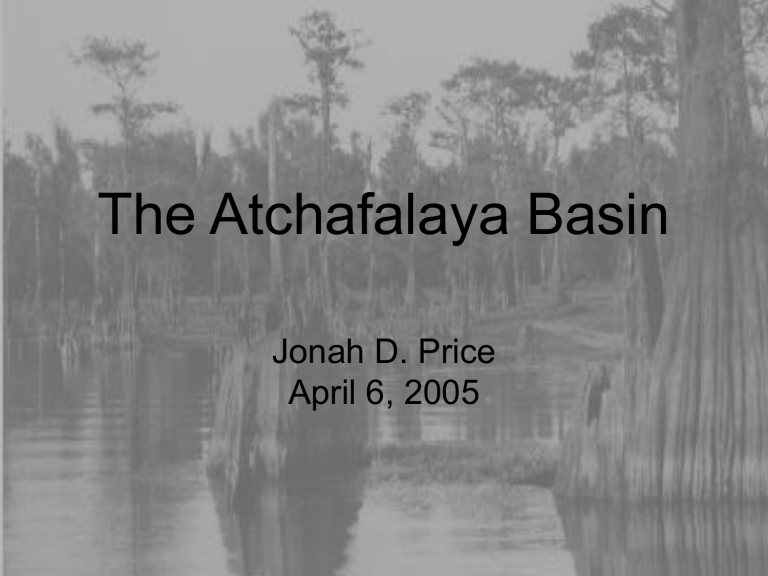
The Atchafalaya Basin
Jonah D. Price
April 6, 2005
Where is the Atchafalaya?
• Its located in
Southern Louisiana
• Covers 595,000 acres
• Largest river overflow in North America
• Largest Contiguous forested wetland
Forested Swamp
Bottomland Hardwoods
Threats
• Development, associated with population growth
• Agriculture
• Logging
• Pollution
• Manipulation of river systems
Disturbances
• Destruction of 3760 acres 1932-1990
• Erosion
• Natural Conversion
• Storm and Hurricanes
• Oil and gas pipelines
The Army Corps
• The U.S. Army Corps of Engineers has been acquiring land since1988 for several different purposes.
• Flood Control Purposes
Atchafalaya Floodway System
• Wildlife habitat conservation
• Public recreation
The Atchafalaya Floodway System
• 50,000 acres of the land is in-fee for public use.
• They also hope to have 33800 acres on purchase easements.
• To date they have approximately only
32,000acres.
• The fee-owned public areas will be opened for use.
Water Flow Through the Basin
• Mississippi River
• Atchafalaya river flows 226,760cfs with a sediment load of 88,223000 tons.
• Wax lake takes 38% of the river flow and
35% of the sediment.
• Lower Atchafalaya River
• Gulf of Mexico
Channeling
• Some effects from the channeling are good.
• Increased sediment deposition
• Other effect are dead zones
• Stagnate water which has caused crawfish production to go down.
Sedimentation
• In the Atchafalya Delta exposed land has increased from 10,000 acres to 19,000 acres in 1995.
Sedimentation Ex.
Is all this Sedimentation good?
• Plants such as duck potato vegetate the small islands (i.e. deltas) and provide excellent waterfowl habitat.
• The placement of sediment from dredging make land in these areas and that land is proving to be good mottled duck habitat for their colonial nesting.
Sedimentation Cont.
• Older islands do move on though and stand of willow take hold and have shown to make great wading bird rookeries.
• Supplemental planting of oaks on these areas help to feed the rising deer population in these areas.
Disturbances Cont.
• Exotic Species
• Water lettuce
• Water-Milfoil
• Alligator weed
• Water hyacinth (hydrilla)
Effects of Exotics
• Crowding out of native plants such as frog bit
• The dense mat of some exotic vegetation block out some submerged vegetation such as coontail
Why is the basin important?
• Fecundity three and one half times that of the everglades
• 1000 and over pounds of fish per acre
• 70 species of fish
• 100 different types of plants have been documented
• 200 species of birds identified
• 60 species of reptiles found
Why is the Atchafalaya Unique?
• It’s a growing delta system
• The wetlands located there are considered nearly stable. Wetland loss between
1932-1990 is only 3760 acres.
Importance to Birds
• Vital staging area for migratory birds
• Provide food and resources for their long flights.
• Breeding Bird Habitat
• One half the migratory species of North
America flyway use this area each year.
Migratory Waterfowl
• Internationally Important Bird Area
• American Woodcock
• Wood Ducks
Public Uses
• 1# in public waterfowl hunting in the nation
– Atchafalaya Delta Wildlife Management Area
• Pleasure boating
• Cultural uses (Chart)
Public Uses Cont.
• Sport Fishing
• Species Found
Cultural Uses
Cultural Uses and Economic Value
• 23 Million Pounds of Crawfish Annually
• Craw fishing is in a way Louisiana cash crop and their state symbol.
• Two year of craw fishing in the 70 paid for a house and a new truck for craw fisher
Roy Blanchard.
• Over all it’s a way of life
What is Being Done?
Atchafalaya National Heritage Act
Purposes
• (1) to conserve, restore, promote, and interpret the significant resource values and functions of the Atchafalaya Basin area and advance sustainable economic development of the area;
Atchafalaya National Heritage Act
Purposes Con.
• (2) to foster a close working relationship with all levels of government, the private sector, and the local communities in the area so as to enable those communities to conserve their heritage while continuing to pursue economic opportunities; and
Atchafalaya National Heritage Act
Purposes Con
• (3) to establish, in partnership with the
State, local communities, preservation organizations, private corporations, and landowners in the Heritage Area, the Atchafalaya Trace State Heritage
Area, as eligible parishes designated by the Louisiana Legislature, as the
Atchafalaya National Heritage Area.
Conclusions
• The Atchafalaya is Important
• Wildlife Uses
• Diversity
• Cultural value
• Public uses
Works Cited
• http://www.epa.gov/owow/wetlands/types
• http://www.fws.gov/refuges/profiles/index.c
fm?id=43614
• http://louisianavoices.org
• http://sea-river.com
• http://cajunculture.com
• More if you really want to know!
